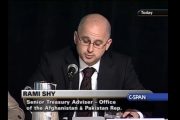
Now that the source of the leak published last week in the Washington Post has identified himself, the response from defenders of the surveillance state was immediate and predictable. Edward Snowden, a 29-year-old employee of a National Security Agency (NSA) contractor, Booz Allen Hamilton, hoped that with the election of President Obama in 2008 the surveillance state in America would at least be partially dismantled. When it was clear that the infrastructure of that vast intelligence community and its increasingly threatening capabilities was continuing to grow, it also became obvious to Snowden what he had to do: “I realized that I was part of something that was doing far more harm than good.”
In an interview with Glenn Greenwald of the British newspaper The Guardian, Snowden explained:
The NSA has built an infrastructure that allows it to intercept almost everything. With this capability, the vast majority of human communications are automatically ingested without targeting.
If I wanted to see your emails or your wife’s phone, all I have to do is use intercepts. I can get your emails, passwords, phone records [even] credit cards.
I don’t want to live in a society that does these sort of things … I do not want to live in a world where everything I do and say is recorded. That is not something I am willing to support or live under.
Snowden is putting everything he treasures at risk: His parents work for the government and he has a girlfriend whom he admits he might not be seeing again for a long time. He was making $200,000 a year and for a while, at least, he felt he had a stable career and a pleasant, enjoyable, and interesting life. But that appears to be over. Said Snowden:
I’m willing to sacrifice all of that because I can’t in good conscience allow the US government to destroy privacy, internet freedom and basic liberties for people around the world with this massive surveillance machine they’re secretly building.
For instance, at his level of security clearance, he could access the entire data set of records for any individual on the planet as long as he had an Internet connection. He explained:
Any analyst at any time can target anyone. Any selector. Anywhere. Where those communications will be picked up depends on the range of those sensor networks and the authority that that analyst is empowered with.
Not all analysts have the power to target anything. But I, sitting at my desk, had the authority to wiretap anyone, from you or your accountant to a federal judge to even the president if I had a personal email….
Even if you’re not doing anything wrong, you’re being watched and recorded. The storage capability of these systems increases every year, consistently, by orders of magnitude, to where it’s getting to the point where you don’t have to have done anything wrong, you simply have to eventually fall under suspicion from somebody, even by a wrong call, and then they can use this system to go back in time and scrutinize every decision you’ve ever made, every friend you’ve ever discussed something with, and attack you on that basis, to sort of derive suspicion from an innocent life and paint anyone in the context of a wrongdoer.
The accusations, recriminations, and threats in response to Snowden’s revelations weren’t long in coming. America’s first Director of National Intelligence, John Negroponte, said, “For me, [this leak by Snowden] is just an outright betrayal of confidences and a violation of his nondisclosure agreement.”
Representative Mike Rogers (R-Mich.), Chairman of the House Permanent Select Committee on Intelligence, discounted Snowden’s disclosures, calling them “inflammatory” and claimed instead that “The National Security Agency does not listen to Americans’ phone calls, and it is not reading Americans’ emails. None of these programs allow that.” Rep. Peter King (R-N.Y.), who sits on the same committee, demanded immediate prosecution of Snowden:
If Edward Snowden did in fact leak the NSA data as he claims, the United States government must prosecute him to the fullest extent of the law and begin extradition proceedings at the earliest date. The United States must make it clear that no country should be granting this individual asylum. This is a matter of extraordinary consequence to American intelligence.
James Clapper (shown), the current Director of National Intelligence, said that any surveillance was well within the law, and besides, there was a court to keep the agency in line. He put this spin on the capabilities of PRISM:
— It is an internal government computer system that allows the government to collect foreign intelligence information from electronic communication service providers under court supervision.
— The government does not unilaterally obtain information from the servers of U.S. electronic communication service providers. It requires approval from a FISA Court judge and is conducted with the knowledge of the provider and service providers supply information when they are legally required to do so.
— The program seeks foreign intelligence information concerning foreign targets located outside the United States.
— The government cannot target anyone under the program unless there is an “appropriate, and documented, foreign intelligence purpose” for the acquisition. Those purposes include prevention of terrorism, hostile cyber activities or nuclear proliferation. The foreign target must be reasonably believed to be outside the United States. It cannot intentionally target any U.S. citizen or any person known to be in the U.S.
— The dissemination of information “incidentally intercepted” about a U.S. person is prohibited unless it is “necessary to understand foreign intelligence or assess its importance, is evidence of a crime, or indicates a threat of death or serious bodily harm.
And, of course, the apologist-in-chief, President Obama, made things perfectly clear with this disclaimer:
Nobody is listening to your telephone calls. What the government is doing is [digesting phone numbers and the durations of calls, seeking links that might] identify potential leads with respect to folks who might engage in terrorism.
There are some positives in all these revelations and denials. First, Jeff Wright, the author of The Citizen’s Last Stand, expanded on Snowden’s explanation and NSA’s capabilities:
Particularly heinous is how much of this activity [exposed by Snowden] skirts the law by having foreign allies (such as the British intelligence agency GCHQ) remotely spying on the [US National Information Infrastructure] and then sharing it with the NSA … That way none of the domestic agencies are in technical violation of their own laws.
And this gives government mouthpieces “plausible deniability” when discussing what the NSA systems do or don’t do….
This current “blip on the radar” may make [American citizens] pause for five minutes and attempt to comprehend the ramifications.
Senator Rand Paul (R-Ky.) is considering suing the agency over the revelation while his father, former Representative Ron Paul, noted that the whole process inverts the law:
What most undermines the claims of the Administration and its defenders about this surveillance program is the process itself. First the government listens in on all of our telephone calls without a warrant and then if it finds something it goes to a FISA court and gets an illegal approval for what it has already done! This turns the rule of law and due process on its head.
Ron Paul then added his support for whistleblowers and those aiding them in getting revelations such as Snowden’s into the public square:
The government does not need to know more about what we are doing. We need to know more about what the government is doing. We need to turn the cameras on the police and on the government, not the other way around. We should be thankful for writers like Glenn Greenwald, who broke last week’s story, for taking risks to let us know what the government is doing. There are calls for the [prosecution] of Greenwald and the other whistle-blowers and reporters. They should be defended, as their work defends our freedom.
Photo of Director of National Intelligence James Clapper: AP Images
A graduate of Cornell University and a former investment advisor, Bob is a regular contributor to The New American magazine and blogs frequently at www.LightFromTheRight.com, primarily on economics and politics. He can be reached at [email protected].



